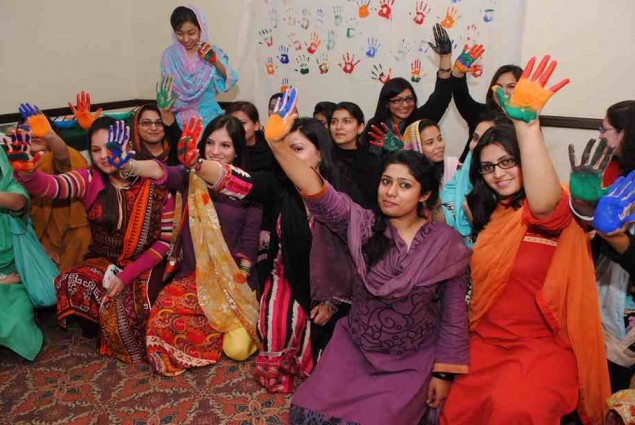
Celebrating International Women’s day through hand raising ceremony Photo credit: USAID Pakistan.
by Abdul Mussawer Safi 16 March 2023
Women’s empowerment is becoming more critical as the world recognizes the necessity of gender justice, and the world celebrates 8 March as women’s day to acknowledge their efforts. Michelle Obama correctly stated, “There is no limit to what we can accomplish as women.” This statement is even more significant in countries such as Pakistan, where women constitute nearly half of 48.54% of the population.
We must afford, as a nation, to pay attention to the potential of such a significant demographic. We cannot hope for progress without empowering women and allowing them the freedom to contribute to society. Former Pakistani Prime Minister Benazir Bhutto stated, “Women empowerment is non-negotiable.”
“Gender equality” is very contestable in eastern society and often convocated wrongly. There is no such concept of gender equality, but rather it could be a gender justice; to deal with gender according to their potential. No woman can act like a man because the morphology of females does not allow them to act like males. The same is the case with males as it also can not replace the position of females in true essence; instead, society can sustain itself by sharing the responsibility.
Like many other countries, Pakistan acknowledges the significance of women’s empowerment and their contribution to the nation’s development. Muhammad Ali Jinnah, the founder of Pakistan, highlighted the importance of women in nation-building. In his 1944 presentation to the All-India Muslim Women Conference, he declared, “No country can achieve greatness without the support of its women.”
Beyond social and cultural arenas, the relevance of women’s empowerment extends. It has a direct effect on economic development as well. Providing women with the resources and opportunities necessary to participate in the national workforce may drive economic growth. According to research by the McKinsey Global Institute, the global GDP might grow by $28 trillion by 2025 if women’s involvement in the economy was equal to that of males.
In Pakistan, women constitute about half of the population, yet their labour force participation remains low. According to the World Bank, just 22.8% of women in Pakistan are employed, whereas 82.7% of males are employed. Nonetheless, attempts have been made to enhance women’s empowerment and increase workforce involvement. For example, the Benazir Income Support Program (BISP) offers low-income women financial aid, allowing them to engage in education and skill development.
Also, there are examples of women who broke down barriers and made essential contributions to the country’s progress. Malala Yousafzai, a Pakistani campaigner for female education and the youngest recipient of the Nobel Peace Prize, has inspired girls worldwide. Marvia Malik, Pakistan’s first transgender news anchor, made headlines in 2018 for challenging gender preconceptions and encouraging inclusion.
Empowering women is essential for their growth and development and the growth and development of their families and society. Women who are educated and empowered have access to resources and can better break the cycle of poverty in their families. As a result of women’s participation in political activities and decision-making, women’s rights are enhanced when they are empowered. In addition, educated and financially secure women are less likely to experience domestic abuse and more likely to report it.
Pakistan’s Struggle for Gender Parity: Progress and Challenges:
Pakistan still has a long way to go despite the significance of women’s empowerment. Pakistan rated 145 out of 146 nations on the Global Gender Gap Index report for 2022, showing a considerable gender imbalance. At the current pace, gender parity will be achieved in 132 years, a minor improvement from the previous prediction of 136 years in 2021.
The study highlighted economic engagement, educational achievement, and health and survival as Pakistan’s most significant issues. Regarding economic involvement, the nation scored 145 out of 156, suggesting a low proportion of women in the labor force. Regarding educational achievement, Pakistan ranks 135 out of 156, with fewer females enrolling in school than boys. In addition, Pakistan scored 143 out of 156 for health and survival, showing a high proportion of female death due to a dearth of healthcare services.
Optimistically, Pakistan was rated 95 out of 156 for political empowerment, showing that more women are engaging in politics and making decisions. Nonetheless, there is still a significant distance before achieving gender justice in all aspects of life.
In addressing women’s rights and gender justice, Pakistan has several challenges. Inconsistent data on violence against women is one of the most significant obstacles, resulting in ineffective policy solutions. 34% of married women have suffered physical, sexual, or emotional violence, according to statistical evidence.
On the economic front, Pakistani women make up just 22.63 percent of the working force, while males account for 84.79%. In consequence, the starting wage of a Pakistani woman is just 16.3% of that of a male.
Pakistan has achieved significant progress toward protecting human rights despite various obstacles. The nation has ratified most international human rights agreements and enacted pro-women laws, such as the National Gender Policy Framework (2022), Anti-Rape Ordinance (2020), and Domestic Violence against Women – Prevention & Protection Act (2019). (2020). The Pakistan Vision 2025, aligned with the UNSDCF 2023-2027 for Pakistan, also places fundamental rights and gender equality at the forefront of the country’s development drive. This indicates the Pakistani government’s dedication to promoting women’s rights and attaining gender justice.
In addition, Pakistan’s first National Security Policy (2022-2026) identifies gender security as a critical pillar and seeks to integrate gender equality into national security narratives. This involves women’s full and meaningful involvement in decision-making, law enforcement, the judicial system, and peacekeeping. Prime Minister of Pakistan Imran Khan said, “We are dedicated to providing women with equal rights, empowering them, and protecting their rights,” highlighting the government’s commitment to promoting gender parity and women’s rights in the country.
